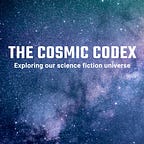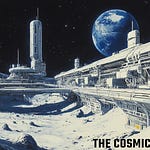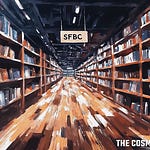Beneath the frozen silence, a world awaits discovery.
Get your FREE copy of Under the Ice by Marie-Hélène Lebeault!
Beneath the frozen silence, a world awaits discovery
In a future where the Earth's surface is uninhabitable, humanity survives under the ocean, within a protective Dome. Ryn, a unique individual unable to adapt to aquatic life like the others, faces a dire situation when the Dome's stability is compromised. As their only hope for survival lies beyond the icy barrier above, Ryn embarks on a perilous journey to the unknown.
Science fiction and libertarian political philosophy have a long history together, perhaps “growing out of the 1930s and 1940s when the science-fiction pulp magazines were reaching their peak at the same time as fascism and communism…” resulting in “…speculations about societies (or sub-groups)…in direct opposition to ‘totalitarianism.’”
In 1979, this close association inspired sf author L. Neil Smith to create the Prometheus Award “to honor libertarian science fiction.”
Dave Freer dedicates his 2023 Prometheus Award winning novel, Cloud-Castles, “[t]o the memory of the men and women of the Eureka Rebellion,” a reference I had to look up. The Eureka Rebellion started in 1851 as a series of protests by gold miners in Australia’s Colony of Victoria against its British administrators. Matters escalated over the next three years, ending with the Battle of the Eureka Stockade, in which twenty-seven people (mostly miners) died.
Freer borrows a number of elements from Australia in general and the Eureka Rebellion in particular, transposing them to the gas-dwarf (mini-Neptune) world of Sybil III.
The planet itself is mostly sky, punctuated by the eponymous cloud-castles (Freer never explains the hyphen) islands of “floating vegetation,” and the “trading-plate.”
Freer’s describes the world he’s created in fascinating detail:
Sybil III just had no land. None. Or none that any human could survive on. It was a gas dwarf world, and its solid core lay somewhere many, many miles down below at enormous temperatures and pressures. The lifezone, such as it was, was up in the outer atmosphere. It was a vast lifezone, just resource poor, and short of solid landing platforms.1
Two extraterrestrial, extrasybillian, and formerly imperialistic species inhabit the cloud-castles, which have been around longer than humans have been in space. Unfortunately, the Thrymi and the Zell hate each other. Their respective interstellar empires seem to have destroyed one another long ago, leaving the sybillian populations the only known (to humans, at least) examples of the two species.
Trade represented the one area of common interest between the two alien societies. Before their empires vanished, they built an “anti-gravity trading plate” in the skies of Sybil III to serve as neutral ground, a tradition the local aliens maintained even after their two species annihilated each other elsewhere.
Humans first arrived on Sybil III aboard the failing FTL ship Botany Bay, which managed to crash on the trading plate. The survivors threw together a ramshackle settlement they named the “Big Syd”, made of scrap taken from the wrecked ship and whatever suitable native vegetation they could gather.
By the time of the story, the Big Syd is a dangerous frontier town in which life reflects a Hobbesian state of nature—“poor, nasty, brutish” and often unnaturally short.
Other human planets maintain embassies on the Big Syd. This is mainly due to competition over the hoped-for attentions of the Thrymi and Zell, who never-the-less tend to snub everyone equally.
Enter Augustus StJohn Thistlewood III, youngest son of the wealthy Thistlewood industrial family on the planet Azure. Augustus is an idealistic university graduate. When he found working in his family’s factories as a boy had already taught him more engineering than his professors knew, he added sociology courses to his workload. As a result, he’s come to Sybil III to help “uplift” the local residents of the Big Syd out of poverty and ignorance.
Augustus follows in the literary tradition of the “lucky fool.” While a brilliant, naturally gifted engineer, he has no “street smarts” at all. Time after time, this places him in perilous situations. Yet somehow everything seems to work out. He often remains blissfully ignorant of the chaos going on around him, which he himself has caused.
Much of Augustus’ good luck is just that—luck. But some of it is manufactured by his local “guide,” Briz, who recognizes his wealth and naivety early and latches on to him as an easy meal ticket:
“She didn’t care what he’d done to be made a remittance man here. It wasn’t something that she needed to know. There were a quite a few men and women that no one wanted back home, going to hell in their own way on the plate here on Sybil. What was important was that he, and the three hundred dollars a month to be delivered via the embassy, was hers. Hers, hers, hers!
She’d found him first!2
A young woman dressed like a Dickensian street urchin, Briz finds herself misidentified by Augustus as a boy and doesn’t bother to correct him.
The first half of the book consists mostly of their hair-raising adventures as Augustus stumbles his way through various well-intentioned but inadvisable attempts to help the Big Syd’s downtrodden.
Then the two find themselves kidnapped by a Thrymi cloud-castle and impressed into a slave gang to process the flying fauna of Sybil III for trading back on the Big Syd. When a daring escape leaves them stranded on an island of drifting plants in the middle of an endless sky, can Augustus’ genius and Briz’s cunning save them? Or will they fall prey to the pioneering “outbackers” who live beyond the confines of the Big Syd in numbers greater than anyone expected?
Cloud-Castles is a humorous romp through a satirical world in which Freer seems to be sending up the attitudes of doctrinaire libertarians even as he skewers the foibles of bureaucracy and academia. For example, he has a lot of fun with the sociology texts Augustus brings with him from Azure:
…from his bedside, he packed up his copies of Melkinthrope’s Suffering the Human Condition, Belcher’s Philanthropy and Uplift, and, of course, his secret vice, and antique copy of On Human Self-Sufficiency. He always tucked it under the other books, as he was rather embarrassed by Kabongo’s rather forthright and unfashionable views. But it did have some fascinating ideas even if he had discovered that many tasks were not quite as simple as the author had made them out to be. Augustus picked up the bag and headed out to help the people of Sybil.3
But I’m pretty sure I also had a big grin on my face when I got to the part where Augustus’ ultra-rich father says “I’m, to be honest, not quite sure what Sociology is, or what they do.”
The best part of the book is how Augustus strides obliviously through one danger after another, intent on his next scheme for social improvement, or his next ingenious invention, like Forrest Gump if he’d been the brilliant Ivy League-graduate son of a billionaire dynasty.
Cloud-Castle’s biggest weakness is its cover. I sympathize with the struggles of self-published authors to secure the rights to original art they can afford. And I believe Mark Baldwin’s illustration might look fantastic in the original. But any charms it may have are lost in reproduction both online and in-print. This is a shame, because I believe many people will pass over this novel who would otherwise greatly enjoy it.
Freer’s book also has the weaknesses of many libertarian novels, or indeed many novels proselytizing for other political, philosophical, or religious systems. The “good guys” (Augustus’ wealthy, self-made family and those on Sybil III who will make it “someday”) are the characters who buy into the favored worldview. Others tend to be either charlatans, saps, or both. As I indicated above, Freer does somewhat better in this regard than more didactic authors. He pokes fun at nearly everyone, including his chosen few. Still, differing perspectives are rarely, if ever, given a fair hearing.
But it’s no great sin for a novel to have a definite point-of-view, and satire is the right vehicle for that sort of story. Freer pulls it off here, and non-libertarians who don’t let ideology spoil their fun will enjoy the ride.
Questions or comments? Please share your thoughts!
My latest novelette, “Nasty, Brutish, and Short,” now appears in Boundary Shock Quarterly 28: SF Horror.
When the first expedition to the mysterious planet Janus takes a deadly turn, Lieutenant Carita Keahi must fight for survival against an alien ecosystem unlike anything humanity has ever encountered. As crew members fall victim to bizarre and lethal life forms, Keahi races against time to escape the dangers of this two-faced world. With mind-bending alien biology and gut-wrenching sacrifices, this tale of planetary exploration gone horribly wrong will keep you on the edge of your seat until the very last page. Prepare for a journey into the unknown that will challenge everything you thought you knew about life in the cosmos!
Dave Freer, Cloud-Castles, Magic Isle Press, 2021, p. 2-3
Dave Freer, Cloud-Castles, Magic Isle Press, 2021, p. 17
Dave Freer, Cloud-Castles, Magic Isle Press, 2021, p. 4















